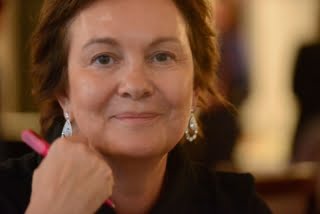
Clara Sánchez
- Spain
- Zu Gast beim ilb: 2014
Clara Sánchez was born in Guadalajara, Spain, in 1955, and grew up in Valencia. She completed her studies in Hispanic philology in Madrid, where she still lives. Before devoting herself entirely to writing, Sánchez worked in television, taught literature at the National Open University and wrote articles for »El País« and other national publications.
Her first work »Piedras preciosas« (1989; tr: Precious stones) was followed by numerous other novels, of which »El misterio de todos los días« (1999; tr: The mystery of everyday) was the first to also appear in German. It depicts a Madrid teacher who develops feelings for one of her pupils; both their lives are thrown off kilter when he returns her affections. Clara Sánchez has received numerous awards, including the 2000 Premio Alfaguara for her novel »Últimas noticias del paraíso« (2000; tr: Last notes from paradise) and the 2013 Premio Planeta for »El cielo ha vuelto« (2013; tr: Heaven has returned). The former book, which has been compared with J. D. Salinger’s »The Catcher in the Rye«, is set in a Madrid suburb where school leaver Fran, uncertain what to do with her life, loses herself in »a world between security and unfulfilled desires« (Scherz Verlag). For the »Frankfurter Allgemeine Zeitung«, Sánchez’s greatest achievement here is that she »presents the feelings of a 19- and 20-year-old as a silent spiritual drama, sympathetically but also through a thin veil of irony [as well as] casting a poetic sheen over the ordinary and casting it into the memory like a personal encounter«. The novel »Lo que esconde tu nombre« (2009; Eng. »The Scent of Lemon Leaves«, 2013) received the Premio Nadal in 2010 and was adapted as a radio play by Westdeutsche Rundfunk the following year under the title »Was dein Name verbirgt« (tr: What your name conceals). In this political thriller Julian, an opponent of Franco who was once interned in a concentration camp, pursues an old Nazi fraternity which has since found a new home in provincial Spain; the game takes a risky turn when he enlists young Sandra, domestic to a Nazi couple, for his own ends. Sánchez’s complex characterisation ensures that we can never be sure who is the hunter and who is the prey, as unresolved as the question of guilt and revenge. Sánchez’s current novel »El cielo ha vuelto« uses the fashion world as a metaphor for our Western society’s fixation on success, and asks the price we have to pay in the hard currency of mistrust of those closest to us – the ones best equipped to hurt us.
Piedras preciosas
Debate
Madrid, 1989
Der Sommer mit Elena
Goldmann
München, 2000
[Ü: Janka Panskus]
Letzte Notizen aus dem Paradies
Scherz
Frankfurt a. M., 2001
[Ü: Lisa Grüneisen]
Was dein Name verbirgt
Hörspiel
Westdeutscher Rundfunk, 2011
El cielo ha vuelto
Planeta
Barcelona, 2013
www.clarasanchez.com
